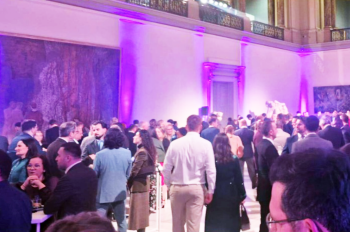
In South Africa, October marks Pride Month—an opportunity for willing actors to commemorate the first Gay and Lesbian Pride march in Africa, held in Johannesburg on 13 October 1990. Then, October 27th marks International Religious Freedom Day, “recalling the signing [in the USA] of the International Religious Freedom Act of 1998 (IRFA).”
Before the IRFA came into existence, the right to religious freedom was already protected by the right to Freedom of Religion or Belief (known hereafter as FoRB), enshrined in the Universal Declaration of Human Rights (1948), the International Covenant on Civil and Political Rights (1966), and the African Charter on Human and Peoples’ Rights (1981), among other international documents.
Defining FoRB
Everyone shall have the right to freedom of thought, conscience and religion.
According to Ahmed Shaheed, former UN Special Rapporteur on FoRB, the UN Declaration on the Elimination of all Forms of Intolerance and of Discrimination Based on Religion or Belief (1981), “is one of the most detailed, but perhaps underused, international documents we have to advance the right to freedom of religion or belief”. Article 1 of the Declaration defines the right to FoRB as follows:
- Everyone shall have the right to freedom of thought, conscience and religion. This right shall include freedom to have a religion or whatever belief of his choice, and freedom, either individually or in community with others and in public or private, to manifest this religion or belief in worship, observance, practice and teaching.
- No one shall be subject to coercion which would impair his freedom to have a religion or belief of his choice.
- Freedom to manifest one’s religion or belief may be subject only to such limitations as are prescribed by law and are necessary to protect public safety, order, health or morals or the fundamental rights and freedoms of others.
A biblical case for FoRB.
Some Christian individuals and organizations make a biblical case for FoRB, including the late Rev. Dr Joel Edwards (an Evangelical), Christian Solidarity Worldwide (CSW) and the World Council of Churches.
FoRB as inclusive of homosexuality
FoRB protects the right to be a homosexual as much as it protects the right to be a Christian.
FoRB is a human right that protects the freedom to believe and live according to a religion and to hold and live according to beliefs that are not religious or concerned with religion, including in the form of homosexuality. In other words, the right to FoRB protects the right to be a homosexual as much as it protects the right to be a Christian (or a person who identifies with and lives according to any other religion).
From what they have written here and here, it appears former Freedom of Religion South Africa (FORSA) Legal Counsel, Advocate Nadine Badenhorst, and former UN Independent Expert on protection against violence and discrimination based on sexual orientation and gender identity, Victor Madrigal-Borloz, would agree that FoRB protects the right to identify as a homosexual and practice homosexuality, or, at the very least, that FoRB and the right to identify and live as a homosexual are not in tension.
The intersection of FoRB, Christianity and homosexuality in Africa
Whether or not Christians recognize FoRB and respect it as a biblically supported right in the first place, what we believe and how we act in light of it matters. It matters if we view it as a right also protecting homosexual. What the right to FoRB means for homosexuals (the protections it offers them) matters, especially in Africa, for several reasons.
Firstly, the majority of Africans identify as Christian. Secondly, Christians in Africa are the “most committed”, meaning they “pray more frequently, attend religious services more regularly and consider religion more important in their lives than Christians elsewhere in the world.”
In Africa, state restrictions on homosexuality... are rising.
Thirdly, in Africa, “[r]eligious leaders are more trusted and less widely seen as corrupt than any other group of public leaders,” potentially lending more weight to what Christian leaders say from behind the pulpit, including about state regulation of homosexuality. Fourthly, in the not-too-distant past (and others still now) several African Heads of State professed to be Christian.
Yet, despite all of this, reporting by the Institute for Security Studies and Amnesty International, among others, shows that in Africa, state restrictions on homosexuality (like violent persecution of Christians) are rising.
According to the Friedrich Naumann Foundation for Freedom, nearly half of the countries that have criminalised homosexuality globally are in Africa. The LGBT Equality Index, which includes the legal status of homosexuality among its measures, clearly shows the inequality that homosexuals experience in Africa compared to the rest of the world.
Could Kenyan Professor of Theology, Bernard Boyo’s observation that “most Christians” in Africa haven’t “thought deeply” about what it means to live in pluralistic states, explain these trends and realities?
Doing unto others as we would have them do unto us
We must not only refrain from supporting state regulation against homosexuality, but actively challenge it.
Irrespective of what practicing Christians like me believe concerning the biblical position and sinfulness of homosexuality, and what the implications are of this belief for church governance and membership (specifically, whether practicing homosexuals may be part of church congregations or not), if we agree there is biblical support for FoRB because the Christian God allows freedom of choice (notwithstanding consequences), and we care for our right to freely express our religious beliefs, we must not only refrain from supporting state regulation against homosexuality, but actively challenge it. Anything short of this is hypocritical.
This doesn’t mean Christians must agree with homosexuality, whether within or beyond the confines of the church, but it does mean that in Africa and elsewhere, we must support the human right of others to hold, practice, and celebrate their beliefs as we have the right to hold, practice, and celebrate ours. Based on the argument set out above, this includes supporting the right of others to practice homosexuality and celebrate Pride Month as expressions of their beliefs.
An expanded version of this article is accessible here.
Craig Bailie holds a Master’s degree in International Studies from Rhodes University and certificates in thought leadership, public leadership, and transformative governance from the Thabo Mbeki African Leadership Institute, Open University and University of the Free State, respectively. He has had the privilege of engaging audiences in several African countries about FoRB. He is the Founding Director of Bailie Leadership Consultancy. He writes in his personal capacity.





